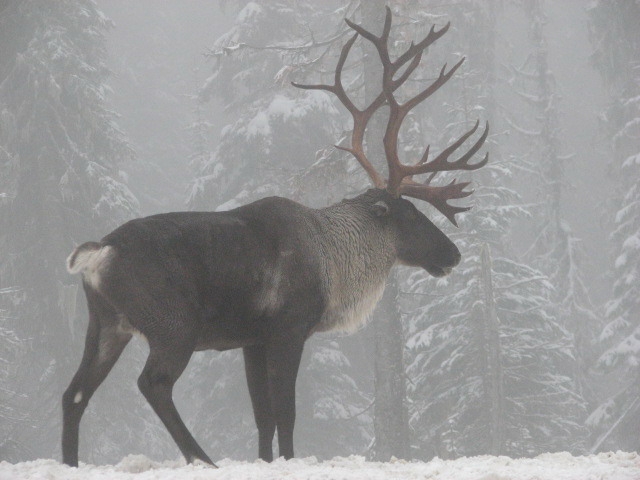
Continuing a trend that has become all too common over the last few months, tomorrow’s meeting to discuss issues around Caribou has been cancelled.
The meeting, which was being planned by the Peace River Regional District (PRRD) was scrubbed less than 24 hours before the meeting was to be held.
“The PRRD continues to be keenly interested in hearing from the province about the plan for caribou recovery and conservation,” says a notice posted on the PRRD website, but gives no actual reason for the cancellation.
This is not the first time the PRRD has had to cancel a meeting on the topic. An earlier attempt at a meeting, on December 7, was also scrubbed. Other attempts to organize meetings have also been cancelled.
Tomorrow’s meeting was to have been with Dave Nikolejsin, Deputy Minister of Energy, Mines and Petroleum Resources, and Mark Zacharias, Deputy Minister of Environment, but “it has been agreed that the PRRD should instead meet with provincial Ministers who have the responsibility for this file.” This meeting is expected to happen at next week’s Resource Forum in Prince George. However, there will not be a public facing meeting.
“The PRRD continues to advocate to the Province that decisions regarding caribou may have a profound impact on both the economy and lifestyles in the region. The province is aware that northern residents have a heightened focus on potential caribou recovery and conservation plans and has and continues to advise that public consultation and ‘robust engagement’ will occur prior to final decisions being made.”
The meeting was in response to rumours going around that the province, in consultation with local First Nations, planned to close down large chunks of the backcountry to industry and recreation without consulting with any other user groups.
This, says members of the Saulteau First Nation in an open letter on their website, is ridiculous. “We understand people in the Peace Region are concerned,” says the letter. “We understand because we are Peace people also. We love the outdoors. We work here, and our people share the same values as you do. We are your neighbours and we all share the Treaty 8 and Peace Region together.”
Instead, they were approached by the government after the caribou were determined to be at “imminent threat.”
“That means that the provincial government must take steps to support caribou recovery, not for First Nations but for all Canadians.”
First Nations were approached specifically, says the letter, for two reasons. “First, because we have a lot of knowledge and experience. Over the past four years, together with West Moberly and wildlife experts, we took a herd that was down to 16 animals, and we have slowly brought it back up to about 80 and growing. That is the most successful caribou recovery program ever, anywhere in the world, and we would like the people in the Peace to be proud of that.”
Secondly, they were approached, as they have the constitutional right to hunt and manage the caribou herds. “Some people might think that’s not fair,” says the letter, “but we ask you to remember that is not our law, that is Canada’s law. Our legal systems are different. (Under our law, we banned our people from hunting caribou decades ago for conservation reasons.)
“We don’t want the caribou to go extinct, we do want the herds to recover. We live in a big country and we think there is room for caribou and for people. And we think that caribou recovery will be good for us, and for everyone in the Peace, and in BC and Canada.”
Still, many people in the region, including the PRRD, are feeling like they are being at best ignored and at workst actively shut out of any discussions around caribou recovery.
“This is an important issue that will affect the entire region in many ways,” says Chair Sperling “we will continue to share concerns on behalf of northeast residents with the Province as they work toward formulating a caribou recovery and conservation plan that is open for public comment”.
“Here are the facts as we understand them,” says the Saulteau letter. “The steps that the federal and provincial governments are thinking of taking are not going to cause mills to shut down. That is just not true. Powder King is not getting shut down. There will not be a ban on river boating. They are not going to restrict recreational access to the bush. There may be some motor vehicle closures in some high alpine areas, but only when and where those activities pose a real threat to endangered caribou herds. There will still be lots of deep snow to ride in. And there will also still be mining, and forestry, and gas and pipelines, and other industries. We are part of the economy in the Peace too, and we don’t want to see economic development stop either.
“There is also going to be lots of consultation with local stakeholders, companies and municipalities in the New Year. There will be lots of time for information sharing and discussions.
It would be better to be patient and have some faith. When people jump the gun and give in to their worst fears, and spread wild rumours, based on false information — it doesn’t help their cause, it actually makes it less likely that governments will listen to them.”
